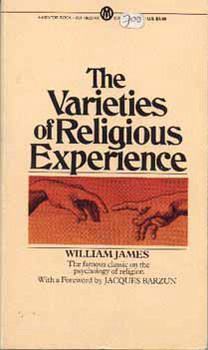Part of the Casswiki article series Books

The Varieties of Religious Experience: A Study in Human Nature is a book by psychologist and philosopher William James, first published in 1902.
This book comprises twenty lectures given at the University of Edinburgh in Scotland in 1901 and 1902, concerning the nature of religion and the neglect of science in the academic study of religion. It is a thought-provoking and insightful work where James applied his analytic clarity to religious accounts from many sources.
James defines the meaning of religion:[1]
Religion, therefore, as I now ask you arbitrarily to take it, shall mean for us the feelings, acts, and experiences of individual men in their solitude, so far as they apprehend themselves to stand in relation to whatever they may consider the divine.
In other words, religion is not defined as something that takes place in churches, but as something felt and experienced in everyday life.
A useful concept we can take from this book is the difference, as discussed by James, between the “healthy-minded” and the “sick souls”, which we can see as the difference between two different kinds of worldview: subjective and objective, respectively. Laura Knight-Jadczyk excerpts and discusses this material in this context in chapter 8 of her book Riding the Wave.
Further information
- Riding the Wave Chapter 8: Everywhere You Look, There Is the Face of God (Contains exerpts and discussion of James’ concept of the different worldviews of the “healthy-minded” and the “sick souls”.)
See also
- William James
- Psychology
- Religion
References
- ↑ James, William. The Varieties of Religious Experience: A Study in Human Nature, p. 32. New York: Longmans, Green, and Co., 1917.
